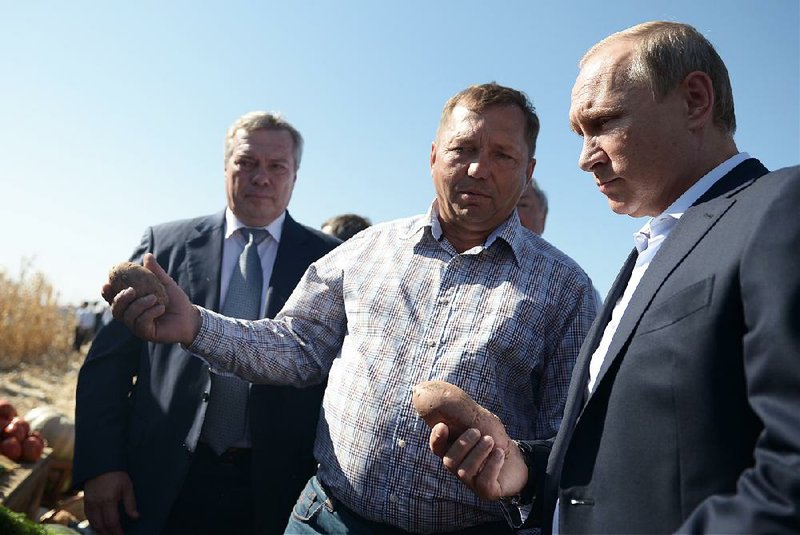MOSCOW -- With dozens of Russian combat jets and helicopter gunships lined up at an air base in Syria, Russian President Vladimir Putin is ready for a big-time show at the United Nations General Assembly.
Observers expect the Russian leader to call for stronger U.N.-sanctioned global action against the Islamic State and possibly announce some military moves in his speech on Monday. He is also to meet on the same day with President Barack Obama.
Fyodor Lukyanov, the editor of Russia in Global Affairs magazine, believes that Putin's moves in Syria are intended to "take the dialogue with the West out of the Ukrainian impasse."
"Syria and the Middle East in general are the problems that attract global attention, and we raise our status by returning there as active players," said Lukyanov, who has strong official connections as the head of the Council for Foreign and Defense Policies, an association of Russia's top foreign policy experts.
The Russian moves in Syria are also aimed at securing what is left of the Syrian state after a series of defeats suffered by President Bashar Assad's army, and saving Alawites from being massacred, Lukyanov said.
Russia also recently has ferried weapons, troops and supplies to an airport near the Syrian coastal city of Latakia, and on Thursday, the Russian Defense Ministry said it was conducting naval drills in the coming weeks "in the eastern section of the Mediterranean," which could include waters along the Syrian coast.
The ministry said Russia always holds an array of military drills at this time of the year and that the government approved the Mediterranean maneuvers a year ago.
Worried by the threat of Russian and U.S. jets clashing inadvertently in Syrian skies, Washington has agreed to talk to Moscow on how to "deconflict" their military actions. Last week, U.S. Defense Secretary Ashton Carter had a 50-minute phone conversation with his Russian counterpart, the first such military-to-military discussion between the two countries in more than a year.
Israel acted similarly, with Prime Minister Benjamin Netanyahu visiting Moscow this week to agree with Putin on a coordination mechanism to avoid any possible confrontation between Israeli and Russian forces in Syria.
As a result of that meeting, a senior Israeli military official said, Israel has set up a joint mechanism with the Russian military to coordinate their operations in Syria and avoid any accidental confrontations.
The official, who spoke on condition of anonymity because of military regulations, said teams headed by each of the militaries' deputy chiefs will hold their first meeting in two weeks and will discuss coordination of aerial, naval and electromagnetic operations around Syria.
For the European Union's part, German Chancellor Angela Merkel said early Thursday that Assad should be part of any negotiations with the West.
"We have to speak with many actors, this includes Assad, but others as well," Merkel was quoted as saying at a news conference after an EU summit in Brussels.
Merkel said negotiations should not only be held with the U.S. and Russia "but with important regional partners, Iran, and Sunni countries such as Saudi Arabia."
The U.S. in particular has been staunchly opposed to negotiating with Iran over Syria. Iran -- along with Russia -- is the strongest backer of Assad.
In Syria, however, Assad's fight against the Islamic State continues.
On Thursday, Syrian government planes carried out several airstrikes and dropped barrel bombs on the Islamic State-controlled city of Palmyra for the third straight day, forcing hundreds of civilians to flee their homes in the ancient city, activists said.
The bombardment, which included at least six barrel bombs on Thursday alone, did not ease up even as Muslims began marking the Eid Al-Adha holiday, said a Palmyra resident, speaking on condition of anonymity, fearing for his life.
Medical supplies in Palmyra, which was overran by the extremist group in May, were dwindling, and there have been deaths from lack of medical treatment or medicines, he added. Death tolls were hard to estimate and only one small hospital was operational. Many people are quickly buried without funeral ceremonies.
The Britain-based Syrian Observatory for Human Rights, which relies on a network of activists on the ground, also reported airstrikes on Palmyra for the past three days. The group confirmed the shortage of medical supplies.
In other news, Denmark announced it will provide mobile radar for the coalition fighting the Islamic State in Syria and in Iraq.
Foreign Minister Kristian Jensen told lawmakers in Parliament the radar would help build an "aerial image in a large part of the area of operations in Iraq and parts of Syria."
The parliamentary foreign affairs committee on Thursday approved the government's proposal to provide the radar for the mission it joined in October 2014.
Information for this article was contributed by Vladimir Isachenkov, Sarah El Deeb and staff members of The Associated Press and by Rick Noack of The Washington Post.
A Section on 09/25/2015



